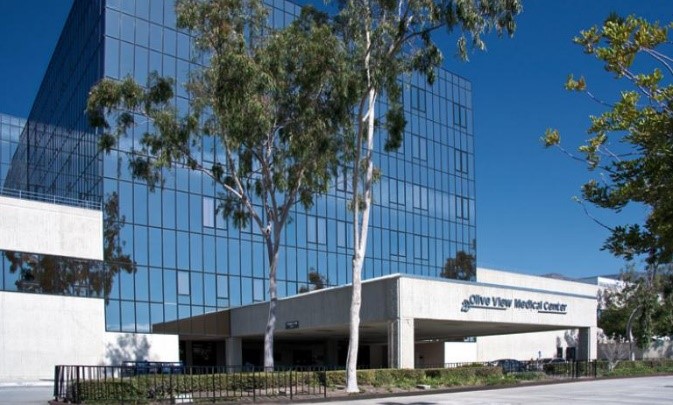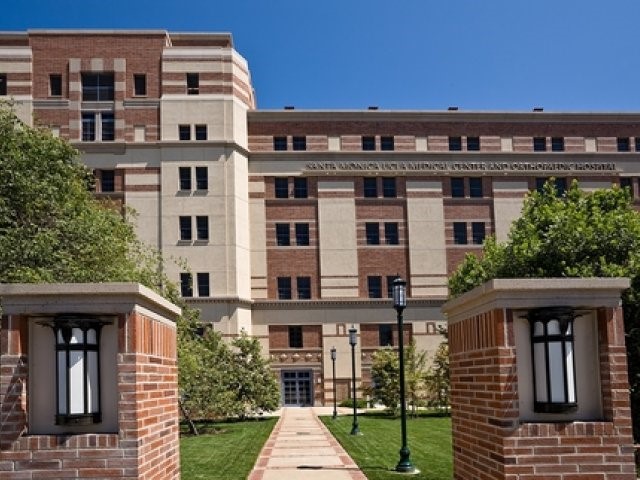
Toxicology
Institutions

Ronald Reagan UCLA Medical Center
The Ronald Reagan UCLA Medical Center (RRMC) is located at the southern end of the beautiful UCLA campus in Westwood. It is a state-of-the-art 520 bed academic medical center that offers a full range of medical and surgical services from primary to sub-specialty care. The one million-plus square foot, 10-story structure encompasses the operations of Ronald Reagan UCLA Medical Center, the Stewart and Lynda Resnick Neuropsychiatric Hospital at UCLA and the Mattel Children's Hospital. UCLA is consistently rated in the top 10 medical centers in the country by US News and World Report. The 41-bed Emergency Department treats 52,000 patients per year and serves as a Level 1 Trauma center, as well as Comprehensive Stroke, STEMI, and Pediatric Critical Care center. There are also hyperbaric chambers on campus.
Olive View-UCLA Medical Center
Olive View-UCLA Medical Center is a public safety net hospital serving the two million residents living in the San Fernando Valley, located at the northern section of Los Angeles County. OV-UCLA is a major teaching affiliate of the David Geffen School of Medicine at UCLA with medical students, residents, and fellows spending a significant portion of their training at OV-UCLA. Residents of the UCLA Emergency Medicine residency program spend 50% of their training at OV-UCLA. The hospital has 377 beds, while the 25,000 square foot Emergency Department, which was built in 2011, has 51 beds. The ED census is roughly 60,000 patients per year. The majority of patients are working poor, immigrants, and/or primarily Spanish-speaking.

Santa Monica-UCLA Medical Center
Santa Monica-UCLA Medical Center (SMMC) is a 265-bed full service community hospital. Located in beautiful Santa Monica, it serves as a center of excellence for orthopedic surgery, pediatrics, obstetrics, STEMI, and recently became a stroke center. The hospital became part of UCLA Health in 1995. The ED is a busy, efficient community practice, serving 50,000 patients per year in a modern 22-bed facility. Attendings supervise medical students in the ED. While residents do not rotate through the ED at this time, residents and fellows from other services (e.g., orthopedics, obstetrics, surgery) are available to perform real-time consultations in the ED.
Curriculum
Educational Objectives
- To provide fellows with a foundation for developing skilled medical toxicologists
- To create future leaders in the field of medical toxicology
- To offer fellows experience in acute care toxicology, medical legal toxicology, addiction medicine, and administrative experiences such as patient safety and the pharmacology and therapeutics committee
- To build the fellow’s teaching portfolio in order to make them competitive applicants after fellowship
Experience
- The UCLA Medical Toxicology Fellowship provides fellows experience managing patients in the in-patient and out-patient setting. The fellows perform bedside consultations at Ronald Regan UCLA Medical Center and Santa Monica UCLA Medical center in their first year. In their second year, the fellows will also provide toxicology consultation at Olive View UCLA Medical Center as well as direct the consultation service. The fellows will evaluate patients in the out-patient toxicology clinic at Ronald Reagan in both their first and second years. In addition, the medical toxicology fellows will perform addition medicine consults.
- The medical toxicology fellows will have an experience with the California Poison Control System. In addition to this poison center experience, lectures will be provided to them by a diverse group of poison center medical directors from across the country.
- Didactic teachings will include standard medical, environmental, and occupational toxicology teachings, supplemented with addiction medicine and pharmacy lectures.
- In addition, the fellows will have lectures on a variety of topics vital to practicing clinical toxicology by experts in their field, including biostatistics, critical care, public health, laboratory principles, hazmat, hyperbaric medicine, administration, and poison center management.
- Fellows will participate in ACMT’s National Case Conference and Journal Club series.
- In addition to didactics that occur following rounds, one day a week will be reserved for a formal educational session with a different theme each week. Themes will include Goldfrank’s review, occupational toxicology, and journal clubs. There will be a series of guest lectures and rotator presentations.
Professional Development
- Fellows may participate in UCLA Emergency Medicine residency program activities as well as faculty development programs.
- Fellows will receive programs tailored to their specific desires.
- Fellows are required to attend the following three meetings annually (American College of Medical Toxicology’s Annual Scientific Meeting, North American Congress of Clinical Toxicology’s annual meeting, and the Western Fellows Conference). Fellows will be encouraged to participate in committees and section activities during the meeting.
- Fellows will be encouraged to participate in ED peer review and run the toxicology peer review sessions.
- Fellows will be involved with the pharmacy and therapeutics committee.
- Fellows will have the opportunity to participate in other administrative experiences related to medical toxicology.
- Fellows will participate in ACMT’s Toxicology Investigator’s Consortium (ToxIC)(https://www.acmt.net/toxic/).
- Fellows will have the opportunity to lecture to multiple groups as well as teach resident and medical student rotators on the toxicology service.
Project/Research
- Each fellow is expected to publish at least one abstract and one peer-reviewed manuscript during the two year fellowship.
- Fellows will be expected to assist the toxicology attendings with ToxIC projects.
Clinical
- Fellows work 5-6 ED shifts per month.
- Fellows will perform bedside and phone toxicology and addiction medicine consultations.
- Fellows will evaluate patients in the toxicology outpatient clinic.
- Fellows will perform addiction medicine consultations.
Social
- Los Angeles is a great place to live!
- Weather is great all year long!
- Easy access to the beach, national parks, skiing, wineries, and weekend getaways
- All big shows, musicals, acts come through LA in addition to NFL, NBA, MLB, NHL, Soccer, and college teams.
Program Faculty
- Michael Levine, MD
- Evan Schwarz, MD
- Cindy Koh, MD (West Los Angeles Veteran Affairs Hospital)
- David Tanen, MD (Harbor UCLA)
- Ryan Morgan, Pharm D
- Paul Wax, MD (ACMT Executive Director)
Salary & Benefits
- Please see more details at: https://medschool.ucla.edu/education/residencies-and-fellowships/incoming-residents/salary-and-benefits
Apply
Interested applicants should send Curriculum Vitae, a Statement of Interest, and 2-3 Letters of Recommendation to:
Evan Schwarz, MD
Fellowship Director
Eschwarz@mednet.ucla.edu
Nathalia Rodriguez
Fellowship Coordinator
Department of Emergency Medicine
1100 Glendon Avenue, Suite 1200
Los Angeles, CA, 90024
nathaliaerodriguez@mednet.ucla.edu
Interviews will be granted to qualified applicants by invitation.
Applicant Requirements
- Graduation from a 3 or 4-year ACGME accredited Emergency Medicine Residency training program.
- Eligible to obtain a California Medical License.
- References available upon request.